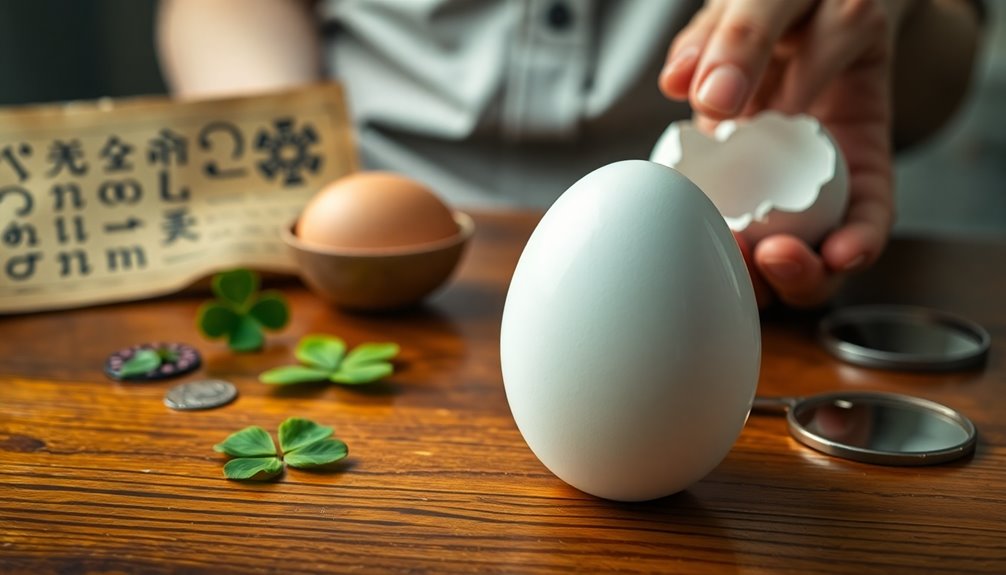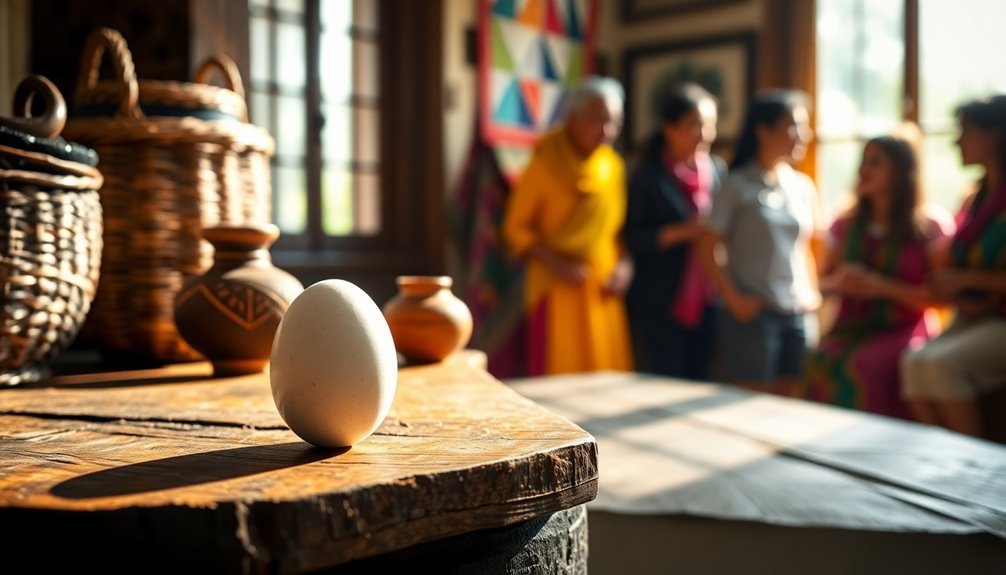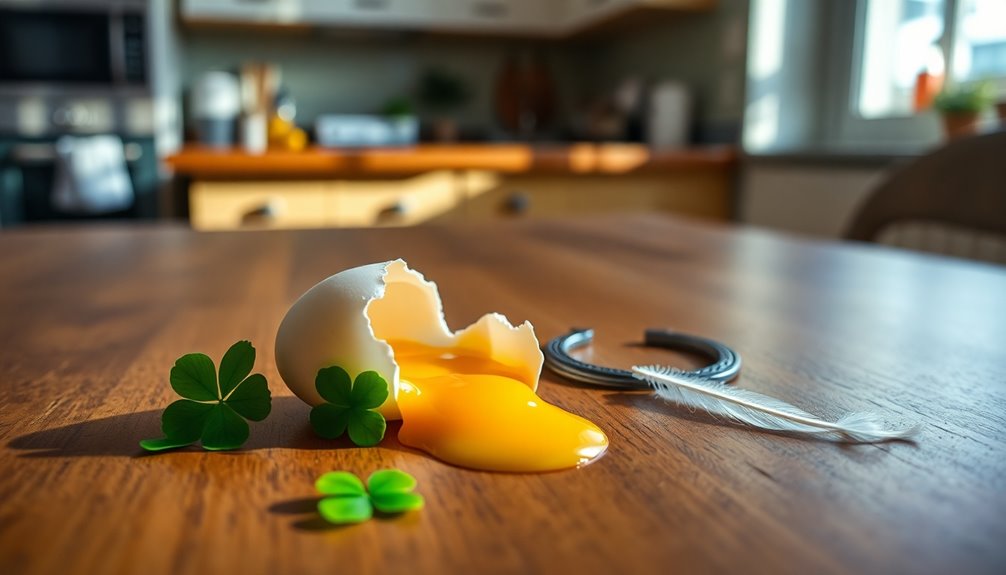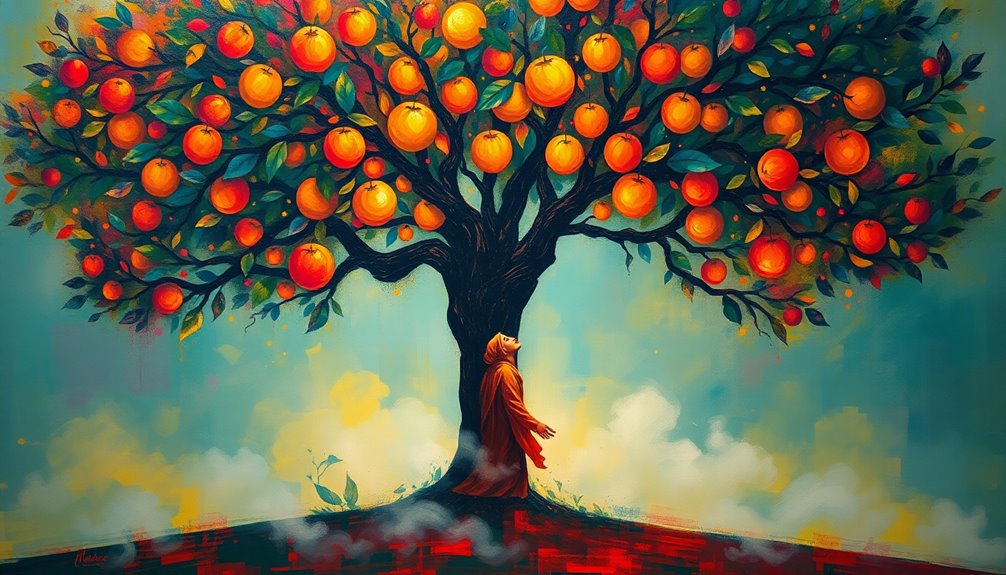Dropping an egg often feels like bad luck because of deep-rooted superstitions linked to fertility and missed opportunities. In many cultures, especially Asian ones, it symbolizes loss and fragility, while in Europe, it serves protective purposes against evil spirits. Historically, eggs embody life and potential, making their breakage significant. These beliefs offer comfort and a way to cope with life's unpredictability. However, from a scientific viewpoint, accidents happen due to human error and grip issues, not luck. So, if you're curious about these intriguing symbols and their meanings, you'll find more fascinating insights ahead.
Key Takeaways
- Dropping an egg is often seen as bad luck, particularly in Asian cultures, symbolizing infertility and lost opportunities.
- Historically, many cultures associate eggs with life and fertility, making their breakage a significant symbol of disruption and loss.
- Superstitions around dropping eggs provide psychological comfort, helping individuals find meaning in random accidents and reinforcing cultural identities.
- Modern interpretations view egg dropping as a simple mistake, emphasizing mindfulness and careful handling rather than attributing it to bad luck.
- Recognizing the randomness of accidents can alleviate fears associated with broken eggs, promoting a rational and resilient mindset.
Reasons for Bad Luck Beliefs

Many people believe that dropping an egg brings bad luck, and there are several reasons behind this superstition. The egg holds deep symbolism in many cultures, representing life, fertility, and potential. When you drop an egg, it's often seen as a disruption of these sacred cycles, akin to the negative energy associated with breaking a mirror. This act can evoke feelings of loss, especially since it signifies lost opportunities and the fragility of your dreams.
Historically, eggs have been revered for their importance in sustaining life, making their breakage particularly significant. When you drop an egg, you're not just losing a valuable food item; you're also reminded of the negative consequences that can arise in your life.
Many cultures emphasize that such mishaps serve as warnings about potential misfortunes, reinforcing the belief that cracked eggs symbolize misfortune. In times of scarcity, the loss of an egg could represent a missed chance for nourishment, further embedding the superstition in daily life.
Historical Origins of Egg Superstitions

Throughout history, people have attached great significance to eggs, viewing them as powerful symbols of life and fertility. Ancient civilizations, like the Egyptians, placed eggs in tombs, believing they represented the cycle of life and rebirth. This reverence carried through to Greek mythology, where eggs symbolized the world's creation.
The act of breaking eggs wasn't just a mundane task; it held a spiritual meaning, with many fearing that doing so could provoke divine wrath and disrupt sacred cycles.
Different cultural perspectives shaped how societies viewed eggs and their integrity. In many traditions, breaking an egg was intertwined with superstitions that suggested it could lead to bad luck or misfortune. This belief stemmed from the idea that eggs were sacred objects connected to the essence of life.
Historical origins of these superstitions reveal a consistent narrative emphasizing the importance of preserving the integrity of eggs.
As you explore these cultural narratives, it's clear that the symbolism of life embedded in eggs has influenced rituals and practices across generations, reinforcing the notion that mishaps involving eggs might bring about unfortunate consequences.
Symbolism of Life and Fertility

Eggs universally symbolize life and fertility, representing potential and new beginnings across cultures. An intact egg signifies hope and the promise of growth, while a broken egg can be seen as a sign of bad luck or lost opportunities. This duality reflects the cycle of life, where fragility plays an essential role. Butter, with its historical significance as a symbol of abundance and prosperity, adds an intriguing layer to the understanding of life's delicate balance.
The spiritual meaning of breaking an egg often highlights a disruption in potential, suggesting that negative energies may be at work. During celebrations like Easter, eggs embody themes of resurrection and renewal, reinforcing their connection to life's transformative power.
When you consider the egg's symbolism, it becomes clear that it stands for both the beauty of creation and the vulnerability inherent in existence. Each egg holds the potential for new beginnings, but its breakage serves as a reminder of life's delicate balance. Quinoa is a complete protein, providing nourishment and vitality that parallel the life-affirming qualities of eggs.
In nurturing this potential, you embrace the fragility of life, acknowledging that new paths can emerge from brokenness. Whether you view a dropped egg as bad luck or a simple accident, it ultimately reflects the complexities of existence and the lessons learned through life's unpredictable journey.
Cultural Perspectives on Eggs

How do different cultures interpret the significance of eggs? Across various cultural contexts, eggs symbolize life, fertility, and new beginnings. In many traditions, they're integral to rituals and celebrations, like Easter and Nowruz.
However, perceptions can vary dramatically. For instance, in some Asian cultures, dropping an egg is seen as bad luck, potentially signaling infertility or misfortune. Conversely, European traditions often embrace eggs in protective rituals, using them to ward off evil spirits.
Ancient civilizations, such as the Egyptians and Greeks, revered eggs as sacred objects linked to creation and divine wrath. Breaking an egg in these contexts was viewed as disrupting sacred life cycles, further emphasizing the symbolism of eggs.
In Hindu traditions, eggs represent the universe, and breaking them is thought to hinder blessings. This belief highlights the fragility of life and the necessity of maintaining harmony.
Clearly, different cultures have developed unique interpretations and rituals surrounding eggs, showcasing their significance in the collective consciousness.
Whether as a harbinger of bad luck or as a sacred symbol, the egg is considered a powerful emblem across the globe. Understanding these perspectives enriches our appreciation of this simple yet profound object.
Practical Reasons Behind the Superstitions

When you drop an egg, it's not just a mess; it's also a loss of valuable food that many cultures recognize.
The fragility of eggs makes you handle them carefully, as each accident can feel like a lost opportunity.
These practical concerns have shaped superstitions around dropped eggs, influencing how you view such accidents in daily life.
Loss of Valuable Food
Dropping an egg can feel like a small disaster, especially in cultures where it's a staple food item. The loss of a valuable food like an egg not only results in waste but also evokes feelings of disappointment. In many households, you might hear the collective gasp or sigh that follows such an accident. This reaction often reinforces the superstition surrounding dropping eggs, where it's seen as a symbol of bad luck.
Historically, food scarcity made wasting anything, particularly fragile items like eggs, a significant misfortune. When you drop an egg, it's not just about the mess; it represents lost potential and opportunity. Each egg carries the promise of nourishment, and when you break that promise, it can feel like a missed chance, contributing to the superstition. Additionally, the importance of early stimulation in a baby's development highlights how every resource, including food, plays a critical role in nurturing growth. The act of dropping an egg can also remind us of the need for preparedness in ensuring we have enough resources on hand.
In cultures that emphasize resource conservation, the act of dropping an egg highlights the fragility of not just the food itself but also the opportunities it represents.
You might find that, in these contexts, the superstitions surrounding the act become a reminder to handle food—and life—with care, considering each moment and resource valuable.
Handling Fragile Items
Accidents with fragile items, like eggs, often lead to superstitions rooted in practical experiences. When you drop an egg, you're not just losing a valuable food item; you're also potentially facing negative consequences tied to cultural beliefs about wastefulness.
Historically, scarcity made every food item precious, and wasting an egg was seen as bad luck. This awareness has contributed to a mindset of mindfulness when handling fragile items.
Here are some key reasons why these superstitions persist:
- Loss of Resource: Dropping an egg symbolizes wasting a food source.
- Cultural Practices: Many cultures emphasize careful handling to prevent mishaps.
- Reinforced Behavior: Superstitions encourage cautious behavior, reducing accidents.
- Mindfulness: Being aware of fragility fosters a greater appreciation for resources.
- Historical Context: Past experiences shape our current beliefs about bad luck.
Psychological Factors in Superstitions

Why do so many people find themselves clinging to superstitions like the belief that dropping an egg brings bad luck? It often boils down to psychological factors that provide a sense of control in unpredictable situations. When you attribute meaning to an accidental occurrence, like dropping an egg, it helps to frame the event within a familiar narrative of luck and misfortune, which alleviates anxiety.
In essence, these superstitions serve as coping mechanisms during times of stress. They connect you with others through shared symbols and collective anxieties, reinforcing social bonds and cultural identities. This communal aspect addresses common fears about fate and fortune, making you feel less alone in your worries.
Psychological research supports the idea that adhering to superstitions fulfills a deep-seated human need for meaning and predictability. The persistence of egg-related superstitions showcases how historical narratives and cultural context shape your modern perceptions of luck and misfortune.
Ultimately, they influence your behavior and decision-making, offering a comforting structure amid life's uncertainties.
Scientific Views on Luck

When you think about luck, it's essential to contemplate how probability plays a role in your beliefs.
Many people confuse chance events with superstitions, leading to a tug-of-war between rational thinking and these ingrained notions.
Luck and Probability Analysis
Luck often feels like a force that can influence our lives, but scientific analysis reveals it's more about probability and chance. Studies show that attributing outcomes to luck can lead to cognitive biases, causing you to misinterpret random events. For example, when you drop an egg, it's not bad luck; instead, it's a random event influenced by various factors.
Consider these points:
- Events are governed by probability, not mystical forces.
- Grip strength, surface material, and environmental conditions affect outcomes.
- Statistical analyses indicate that accidents, like dropping eggs, are common and random.
- Superstitions often arise from our psychological need to find patterns in randomness.
- There's a lack of empirical evidence linking luck to specific outcomes.
Thus, the belief that dropping an egg brings bad luck reflects a misunderstanding of probability and the nature of random events.
Instead of seeing these accidents as omens, recognize them for what they are: everyday occurrences without significant implications for your future. Embracing a rational view helps you break free from the grip of superstitions.
Rationality vs. Superstition Debate
Exploring the divide between rationality and superstition reveals how deeply ingrained beliefs can shape our perceptions of chance events. When you drop an egg, you might think it brings bad luck, but scientific rationalism suggests otherwise. Accidents, like this one, are often just the result of gravity and human error, not mystical forces.
Superstitions often arise from our psychological needs to find meaning and control in unpredictable situations. It's easy to make symbolic connections between an egg drop and subsequent misfortunes, but remember that correlation doesn't imply causation. Just because something bad happens after you drop an egg doesn't mean the two events are linked in a meaningful way.
Encouraging a rational perspective on these accidents can help you cultivate resilience. Instead of fearing the supposed bad luck from dropping an egg, acknowledge it as a simple mistake.
Modern Interpretations and Practices

Dropping an egg often stirs a mix of reactions, ranging from mild annoyance to a sense of foreboding. In modern contexts, many people interpret this mishap as a simple accident rather than a sign of bad luck. However, remnants of old superstitions still linger, reflecting cultural narratives that persist in our lives today.
You might find yourself engaging in certain rituals to avoid these accidents, such as:
- Carefully storing eggs to prevent breakage
- Practicing mindfulness while cooking
- Performing counter-rituals to dispel bad energy
- Sharing stories of mishaps to bond over experiences
- Using humor to diminish the significance of the event
These practices illustrate how we navigate the tension between rationality and superstition. In many ways, these rituals can be seen as a form of self-reflection that helps individuals cope with their experiences.
Even when you know an egg's drop is just that—a drop—you might still feel compelled to adhere to these customs. This psychological need for control helps explain why dropping an egg can evoke feelings of disruption or impending misfortune. Incorporating positive affirmations, similar to those used in Law of Attraction principles, can also help shift your perspective on such mishaps.
Ultimately, the blend of modern interpretations and lingering beliefs shapes how we respond to what's often just a broken shell.
Frequently Asked Questions
What Is the Superstition About Eggs?
You might've heard that dropping an egg is a bad omen. This superstition stems from the egg's connection to life and potential. When you drop an egg, it symbolizes lost opportunities and disruption.
Many cultures associate this act with impending misfortune, reflecting deeper anxieties about life's unpredictability. Plus, in times of scarcity, wasting food like eggs only fuels the belief that such accidents invite bad luck into your life.
What Is the Meaning of Breaking Eggs?
Breaking eggs, eh? It's like a dramatic pause in life's play, where dreams go to crack!
You might see it as a symbol of failure or unfulfilled hopes, but don't fret. It also hints at new beginnings and transformation, reminding you that every setback can lead to growth.
Just remember, the size of that broken egg matters—bigger ones might carry bigger implications, so tread carefully in your decision-making!
What Is the Superstition That Brings Bad Luck?
When you think about superstitions that bring bad luck, a few common beliefs come to mind. Many people avoid walking under ladders or breaking mirrors, as these actions are often linked to misfortune.
You might also hear that spilling salt invites bad luck unless you toss some over your left shoulder. Each of these superstitions reflects a cultural narrative that encourages caution and mindfulness in daily life, shaping how you perceive luck and misfortune.
Is a Bad Egg a Bad Omen?
When you stumble upon a bad egg, it's like uncovering a dark cloud hovering over your day.
Many believe a bad egg carries a bad omen, hinting at misfortune or illness lurking nearby. Consuming one might feel like inviting chaos into your life, reinforcing fears of betrayal or failure.
You might want to tread carefully, as this symbol can disrupt your harmony and remind you of life's fragile opportunities.
Trust your instincts.
Conclusion
In the end, whether you believe dropping an egg brings bad luck or not, it's clear that superstitions shape our perceptions. Just like a fragile egg, our beliefs can crack under scrutiny, revealing deeper layers of meaning. Embracing the symbolism of life and fertility, you might find that these ancient tales serve a purpose beyond mere misfortune. So, the next time you drop an egg, consider the possibility that it could be a chance for new beginnings instead.










